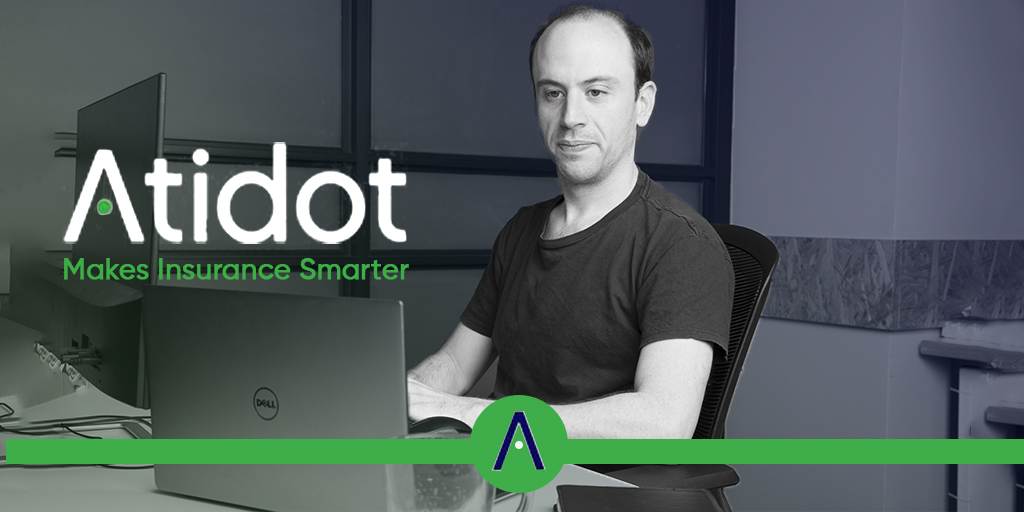Barak Bercovitz, Co-Founder and CTO of Atidot, has applied nearly a decade’s worth of IDF intelligence training to the niche space of long-term insurance and the results have proved fascinating. Meeting his fellow Co-Founder, Dror Katzav, during his army service, Barak explains, “What we learned to do in a very systematic way in our unit is solve ‘seemingly impossible problems’.”
Together, Barak and Dror continued seeking out other unique industries facing “insolvable challenges,” believing that where there is challenge, there is also phenomenal opportunity. Rather than moving into more predictable spaces such as Cyber or Telco, the two became intent on disrupting an industry to create long-lasting change and efficiency.
“We really wanted to make a change. In a way, we wanted to build teams like we used to build in the army to tackle big challenges. Eventually we decided that the insurance industry was one that really needed many changes in how it’s working and operating.”
Detailing a picture of how insurance looked 10 years ago, Barak says “There are all the advances in tech, cloud computing, elastic computing powers and all of that, but insurance professionals are not able enjoy those benefits because they are locked Makes Insurance Smarter
down to legacy systems and older data. The processes are a mess! We realized we wanted to bring our knowledge of how to build very reliable products and solutions that also can be easily operated by insurance people and actuaries.”
Doing so would mean spurring a groundbreaking shift away from traditional insurance practices and moving towards data-driven methods. This would not be an easy task, as insurance companies have become accustomed to tedious manual work as well as spending “hundreds of thousands if not millions of dollars” on consultancy companies to come up with reports.
“Insurance professionals never received a user interface, a dashboard, a tool that is easy enough for them to use—without becoming software developers themselves—to help solve challenges, which include optimizing the book of business, new business, in-force business and basically becoming a data driven business.”
Coming together with their third partner, Assaf Mizan, who at the time was Chief Actuary for Israel’s Ministry of Finance, gave a big push for Atidot to move forward. “Basically, he completed the picture and focused us further on the long-term insurance business, which has many nuances and challenges that are specific to that subfield. Predicting and knowing what’s going to happen in 10 or 15 or 20 years’ time is challenging enough, but the ways it’s been done so far using classical statistics or classical actuarial sciences is really not good enough and can’t be compared to the new solutions of predictive analytics and machine learning that all companies use today.”
Looking with Hindsight
challenges facing the long-term insurance industry. To build their platform, they began researching how insurers used existing technologies and data, as well as the accompanying roadblocks insurers kept meeting along the way.
Barak recalls, “A lot of trial and error from a research perspective but also from an engagement perspective: What are we offering our clients? Are they going to like it or not? Are they willing to pay for it or not? How to work with them? There are big cultural differences with companies from all around the globe and technical issues even with things like privacy regulations, which in a way makes engagement more challenging.”
We realized we wanted to bring our knowledge of how to build very reliable products and solutions that also can be easily operated by insurance people and actuaries.
Barak made sure to add, “But again, when anything is challenging, there is a big opportunity to win by using a combination of an understanding of the insurance business and software development, and by bringing in our machine learning expertise. If we find a way to solve those problems with automation or computer science, then it’s a great win for us.”
Recalling in hindsight some of the Company’s earliest achievements, Barak noted the significance of aligning with some of the biggest insurance companies in the US, which is not trivial for a small Israeli startup. Other important junctures during Atidot’s early stages included the recruitment of a strong development team, marketing and sales personnel, and actuaries who understood the ins and outs of the insurance business. Although today the Insurtech field is exploding, pitching to VC’s in the Company’s earlier stages meant proving the potential of an entirely new category.
“When we began, we just wanted small Israeli companies to talk to us and give us access to their data,” Barak says. Then, “we started developing more of our intellectual property that includes tools that analyze data sources automatically, and solutions that model insurance in better ways than it’s been done before. We started marketing to and approaching American companies, and we managed to get some big lines to talk to us, which was amazing! We really leveraged our connections to do more of that while also developing our understanding of the specific challenges per geography, per company, per scale, for big and small companies alike.”
From here on, the technology itself seemed to take the lead, cutting insurer’s costs and offering deliverables in record times, something that the insurance world had never seen before. The holistic approach of Atidot’s technology helps insurance experts “scope their problems and distill and focus the questions and solutions”. The results are then in the insurer’s hands, tangible and usable in real-time, for actuaries, marketing teams and management alike.
Problem-Solving in the Future
“As a startup we are in a constant street fighting mode to understand what is the best direction and the best way to help as many companies as we can.”
As the world is changing, so are the challenges insurance companies are facing. Currently, long-term contract insurers suffer from high percentages of lapsation and churn, and
The holistic approach of Atidot’s technology helps insurance experts “scope their problems and distill and focus the questions and solutions”.
specifically in the US, there is the ominous question of under-insurance. “Something like 40% of the US is under-insured, meaning their insurance won’t cover their real needs, which is potentially a big problem for a country like the US if something like 2008 were to happens again.” For statistics and information on under-insurance in the US, read Atidot’s most recent Annual Insurance Report.
“We have to adapt ourselves all the time,” Barak explains, “but we’ve built the organization in such a way that we can support those changes and be agile. We try to be agile and answer our clients’ needs as much as we can. From a technological perspective, we developed our solution with an understanding that things are going to change, and if we want to stay competitive and support those changes, we have to model insurance from the ground up.”
As CTO and Chief Visionary Officer, Barak has to stay focused on the company’s long-term vision of becoming the “Bloomberg for insurance policies,” or in other words, becoming the single point of knowledge for universal values of insurance policies. Barak believes there is a growing market for insurance policies, reinsurance and the hedging of insurance data. He explains, “Insurance policies are a financial instrument like a bond or a stock, so our vision is to become a company that has the most powerful and accurate understanding of quality life insurance companies and their strategies.”
“From a tech perspective, I envision regulators and companies using our software libraries and our programming language for insurance because it is such a good language, and lets them express their ideas and scenarios in the insurance domain very easily”. Reaching this goal means identifying which technologies Atidot should be using, learning and developing today to lead the way for success in years to come. To reach these goals, Barak’s top priority is keeping a strong team around him, one that grows better together and continues to find the best insurance solutions out there.
When asked which key skills a company leader needs to succeed, Barak again embraced what he found to be a challenging question. Out of countless qualities he felt helped him along the way, he named patience, ambition and having the right people around as the building blocks of his journey.
“There are so many hurdles when you start a company. You can never win it all. You keep falling and getting up again and again. One important thing is being patient and understanding that no one, really no one, has succeeded without failing. That’s why we chose a tech solution that from the beginning assumes that there will be mistakes and that we can fix them as we go.”
He continues, “What I mean when I say patience and ambition, is that it’s really all about people and their personalities. It’s not about someone’s personality specifically; it is about the collective personality.
When you start a company like ours, you have to believe in co-workers and trust them and give them space to perform. This is something very common in Israeli culture for everyone to come up with ideas, and managers here usually don’t dismiss them, which I’m not sure happens elsewhere in the corporate world.”



 min read
min read 
 min read
min read

 min read
min read



